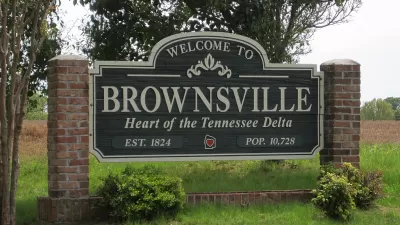Chuck Eckenstahler examines the “Benton Harbor Rule”—the desired funding and support that comes from a designation by the federal government as “metropolitan.” But does the “metropolitan” designation pay off as intended?
“In the 1970’s being ‘metropolitan’ meant more than increased state and federal money, according to the supporters. ‘Metropolitan’ meant growth – increasing population and prosperity,” writes Chuck Eckenstahler.
After a successful lobbying effort by local political leaders, Benton Harbor-St. Joseph was one of nine new Metropolitan Areas created for the 1980 Census. Eckenstahler examines the population growth of Benton Harbor-St. Joseph since then to examine if the designation paid off.
“This data reveals population of the Benton Harbor/St. Joseph MAS did not grow to the same extent as other comparative MSA’s created in 1980 – being a population loss of 8.4% compared to a 35.2% growth in population over the past three decades.”
Eckenstahler then explores dynamics like “geographic isolationism” and “paralysis of political geography” as causes of the decline.
FULL STORY: Does Calling Someplace a Metropolitan Area Make It So?

Planetizen Federal Action Tracker
A weekly monitor of how Trump’s orders and actions are impacting planners and planning in America.

Map: Where Senate Republicans Want to Sell Your Public Lands
For public land advocates, the Senate Republicans’ proposal to sell millions of acres of public land in the West is “the biggest fight of their careers.”

Restaurant Patios Were a Pandemic Win — Why Were They so Hard to Keep?
Social distancing requirements and changes in travel patterns prompted cities to pilot new uses for street and sidewalk space. Then it got complicated.

Platform Pilsner: Vancouver Transit Agency Releases... a Beer?
TransLink will receive a portion of every sale of the four-pack.

Toronto Weighs Cheaper Transit, Parking Hikes for Major Events
Special event rates would take effect during large festivals, sports games and concerts to ‘discourage driving, manage congestion and free up space for transit.”

Berlin to Consider Car-Free Zone Larger Than Manhattan
The area bound by the 22-mile Ringbahn would still allow 12 uses of a private automobile per year per person, and several other exemptions.
Urban Design for Planners 1: Software Tools
This six-course series explores essential urban design concepts using open source software and equips planners with the tools they need to participate fully in the urban design process.
Planning for Universal Design
Learn the tools for implementing Universal Design in planning regulations.
Heyer Gruel & Associates PA
JM Goldson LLC
Custer County Colorado
City of Camden Redevelopment Agency
City of Astoria
Transportation Research & Education Center (TREC) at Portland State University
Camden Redevelopment Agency
City of Claremont
Municipality of Princeton (NJ)





























